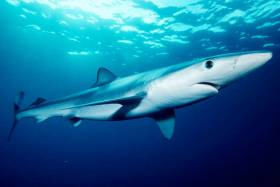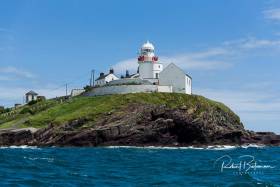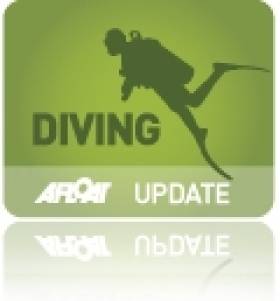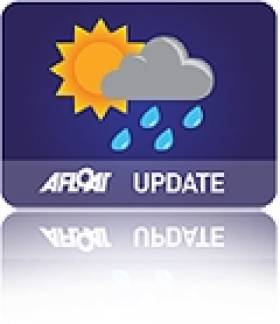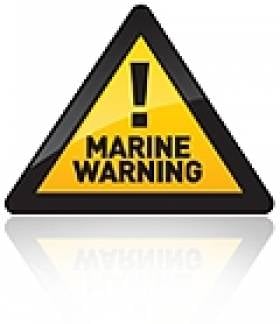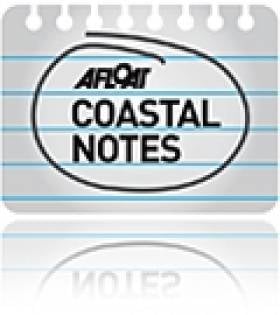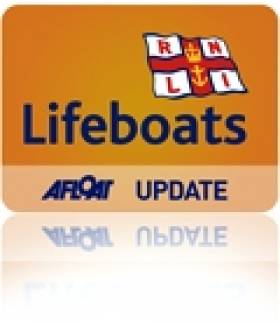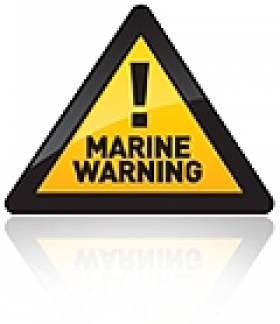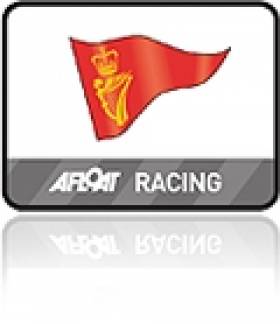Displaying items by tag: Roches Point
Shark Bite Sea Angler Is Already Back Fishing
#Angling - A Belfast angler bitten by a blue shark at the weekend resumed his sea fishing trip within days of the incident, as the Belfast Telegraph reports.
Robert Malcolmson was rushed to the mainland by Crosshaven RNLI last Saturday evening (1 September) after he was bitten on the arm by the shark he and his friends were landing on the deep sea angling boat Deora De off Roches Point at Cork Harbour.
The 40-year-old lost a lot of blood from the four-inch wound on his arm — but after treatment at Cork University Hospital, he was back out at sea by Monday.
The Belfast Telegraph has more on the story HERE.
To mark the 200th anniversary of the lighting of the first light at Roches Point at the entrance to Cork Harbour, the lighthouse was opened to the public on Saturday, 4 June.
In the birthday celebrations, Cork Harbour Heritage Alliance in association with the Commissioners of Irish Lights visitors had access to the lighthouse compound where former lighthouse keepers were at hand to guide and inform. There was also controlled entry to the lighthouse balcony for able bodied adults and several other viewing areas around the compound to take in the stunning views. There was an exhibition explaining the involvement of the US Navy in Cork Harbour during WWI.
Limerick Man Dies After Roches Point Dive
#Diving - RTÉ News reports that a man has died while diving near Roches Point at Cork Harbour yesterday (14 June).
The 45-year-old from Limerick, believed to be a member of a volunteer dive search and rescue team in North Cork, was rushed to treatment after surfacing from a dive.
Crosshaven RNLI reports that its lifeboat met the dive craft off Fort Camden and transferred volunteer crew member Ian Venner on board to administer first aid to the casualty.
The lifeboat was met ashore by lifeboat medical advisor Dr John Murphy, and first Aid continued until the casualty was handed over to the ambulance service. The Irish Coast Guard helicopter Rescue 117 from Waterford was also tasked.
The diver later died at Cork University Hospital.
RTÉ News has more on the story HERE.
Weather Warning for Irish Sea as Winter Winds Sweep In
#WEATHER - Met Éireann has issued a weather warning for the Irish Sea for the next 24 hours due to expected gale force westery winds.
A small craft warning has also been issued, with west to southwest winds continuing to reach force 6 tonight on the Irish coast from Carlingford Lough to Roches Point to Slyne Head.
The high winds marks the first wave of real winter weather after a milder-than-average November, the Evening Herald reports.
A forecaster told the paper that strong winds have "reached storm force on the Irish coasts from Belfast Lough to Wicklow Head to Mizen Head and on the Irish Sea.
"We expect that by tonight they will slightly drop but may still reach a strong gale force."
Marine Notice: Drilling Off South Coast
#MARINE WARNING - The latest Marine Notice from the Department of Transport, Tourism and Sport (DTTAS) advises that offshore drilling has commenced off the south coast.
The semi-submersible drilling unit Arctic III (callsign YJSU9) will be drilling some 65km south of Roches Point, Co Cork, for a period of approximately three months.
The drilling unit will have a dedicated stand-by safety vessel and supply vessel, both listening on VHF channel 16 throughout the project.
All vessels, particularly those involved in fishing, are urged to give the drilling unit and its handling vessels a wide berth of at least 500 metres and to keep a sharp lookout in the area.
Full location co-ordinates and further details are included in Marine Notice No 53 of 2011, a PDF of which is available to read and download HERE.
GardaI Investigate U-boat Looting in Cork
Cork gardaí are investigating the looting of items from a First World War U-boat recently discovered off Roches Point.
The Irish Times reports that the submarine also appears to have been damaged by the illegal salvagers.
A spokesperson for the underwater archaeology unit of the Department of Arts, Heritage and the Gaeltacht confirmed that reports had come in from divers regarding disturbance of the wreck site - noting attempts to remove parts of the structure, and details of human remains.
Divers with the unit were expected to assess the site as soon as weather permits.
Items believed to have been taken include sailor's attire belonging to the crew of the 49-metre German vessel UC-42, which sank in 1917. The German embassy has indicated its "legitimate interest" in the preservation of the wreck.
The Irish Times has more on the story HERE.
There Is More To The Water Underneath
My time on the water has been spent 'on the surface,' but those who like to go underwater tell me the attractions of diving are magnificent and that Cork Harbour, my sailing base atop the water, is one of the great 'dive spots' on the Irish coastline.
There are many ways to enjoy the water, so I believe in encouraging everyone who takes parts in watersports. That is one way in which appreciation of the importance of the marine sphere can be advanced.
The Irish Underwater Council, Comhairle Fó Thuinn, known by its initials 'CFT,' promotes diving and is the national governing body for recreational underwater sports in Ireland. Through affiliated clubs, it provides training for diving and snorkelling.

"It's time to dive," the CFT says. "We provide the opportunity for recreation and fun in a friendly environment while maintaining a safe and cautious attitude to Irish waters. The basic objective of the training system is to demonstrate, teach and practice all the necessary abilities until the beginner is comfortable with the equipment and basic safety skills. There is no pressure of time limits and training is at the individual's own pace."
The CFT was founded in 1963 when underwater enthusiasts wanted to establish a national group which would organise and promote sport scuba diving and snorkelling. At that time there were six clubs around the country. The number has now expanded to 84.
I was talking in the past week to just one of those clubs - the Cork Sub Aqua Club which is encouraging more people to take up the sport. It has been in existence for 40 years and organises dives on Wednesday evenings during the Summer and on most Sundays throughout the year. There are visits to dive sites outside of Cork and wreck-diving is organised to suit ability and experience. Divers come from all ages and backgrounds, so there is a great opportunity if for anyone interested to get involved.
"We will begin training new recruits in January, so anyone who joins will be ready for open water by the Spring. No experience is necessary," the club says. "Our qualified instructors are waiting for newcomers and, for anyone already qualified, we say join and dive with us."
The photograph on this week's blog shows two divers enjoying their time in the water, even in this cold period of the year. Niall O'Regan from Monkstown in Cork and Ian Kelleher were diving off Roche's Point. They had a look at a trawler which sank in the area back in the mid-80s. The attraction of diving for them is "the great diversity of sea life to be found around the harbour and the quiet and tranquillity underwater in comparison to the hustle and bustle on land." That is a well-expressed sentiment which I like and encourages me to tell you that I am continuing with attempt to develop my idea for the establishment of an Irish maritime foundation. My thanks to those readers of this blog who Emailed me about it. Some good ideas have been put forward and more are always welcome.
For anyone interested you can get more information about the Irish Underwater Council by Emailing: [email protected] or about membership by Email to: [email protected]
You can Email me in response to items on this blog at: [email protected]
This article is reprinted by permission of the EVENING ECHO newspaper, Cork, where Tom MacSweeney writes maritime columns twice weekly. Evening Echo website: www.eecho.ie
Lifeboat Assists Sinking Fishing Vessel in Cork Harbour
Yesterday while out on exercise in a squally southwesterly force four winds the crew of the Ballycotton lifeboat Austin Lidbury received details of a 26 foot fishing vessel that had sunk off Roches Point, at the mouth of Cork Harbour. The two crew members had taken to a liferaft and were retrieved by a fishing vessel in the area. Crosshaven lifeboat also launched and was first on scene. Ballycotton lifeboat was stood down and returned to station.
Related Safety posts
RNLI Lifeboats in Ireland
Safety News
Rescue News from RNLI Lifeboats in Ireland
Coast Guard News from Ireland
Water Safety News from Ireland
Marine Casualty Investigation Board News
Marine Warnings
Gale force westerly winds Gusting to 140km/h
Met Eireann have issued a severe weather warning.
Southerly gales or strong gales developing this evening and for a time tonight on all coasts and on the Irish Sea. Winds veering westerly tonight and continuing to reach gale force on coasts from Roches Point to Erris Head to Malin Head overnight.
Stormy conditions will affect Ireland Thursday afternoon, evening and for much of Thursday night. Gale force westerly winds will gust between 100 and 120 km/hr generally, but gusts of up to 140 km/hr are expected in exposed parts of Connacht and Ulster. These winds are likely to lead to some structural damage and will be accompanied by high seas on Atlantic coasts. Winds will moderate considerably towards dawn on Friday.
More HERE
29 Compete in CH Marine Winter League
A very good fleet of 29 cruisers came to the line for the first day of the CH Marine Winter league writes Claire Bateman. The first radio sound to be heard was the familiar voice of Afloat correspondent Tom MacSweeney, who was PRO for the occasion, advising the course to be sailed would 99, sailing Classes One and Two together and Classes 3 and White Sail also together. An equally well known voice came back wondering whether there would be water at one particular mark!!
The sea was flat and there was a fitful wintery sun. In spite of the dire forecast that had been promised, one could have been doing a lot worse than enjoying a race in Cork Harbour.
The course turned out to be a good choice as it is divided into three parts and could be shortened after any one of the three rounds. The wind from the ESB stack at Whitegate was showing north west, Met Eireann report from Roches Point was giving 5 knots from the west and the Race Officer for the Laser fleet was setting a course for a south west wind. It was that kind of day.
It was an off wind start and True Penance with Joe English on spinnaker got the best start with End Game just behind with Jimmy Nyhan trimming the spinnaker, and Bad Company was looking good as well on the shore side. Magnet was throwing all sorts of shapes at the cage but a was bit slow hoisting her spinnaker.
Classes Three and White Sail sailed one round of the course and Classes One and Two got in two rounds. This worked out very well because as the race progressed the tide was getting stronger and this helped the boats to make it out the harbour against the tide so it all jelled very well.
The prize giving followed at which CH Marine presented the competitors with very seasonal and acceptable bottles of wine and boxes of Cadburys Roses and immediately afterwards the threatened rain began to pour down but as this stage the competitors were not bothered as they were ready to go home having enjoyed a great day of racing.
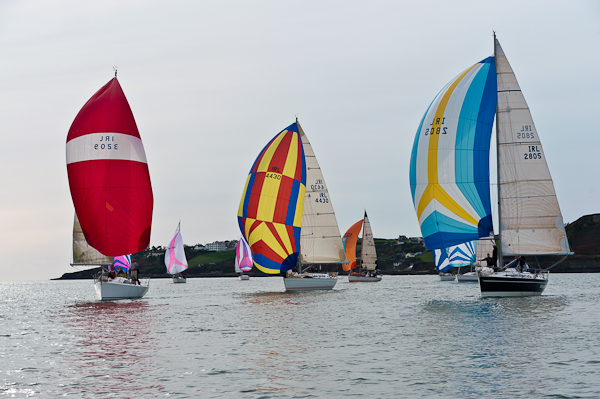
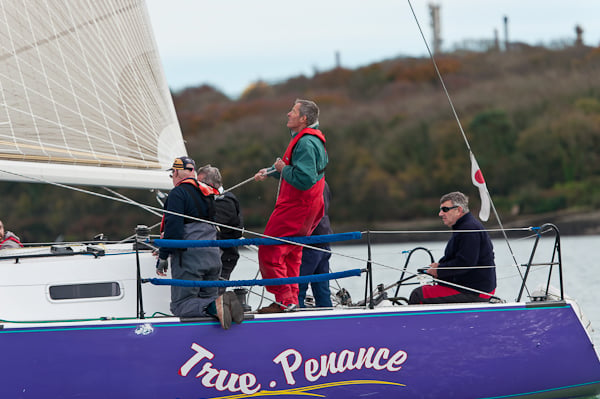
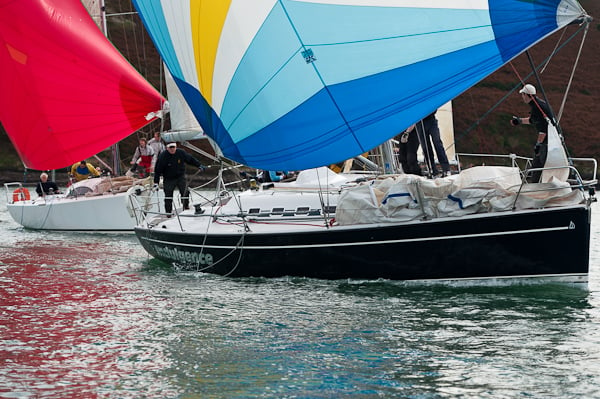
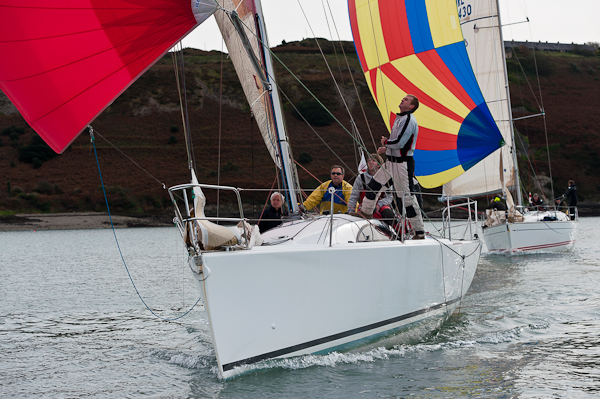
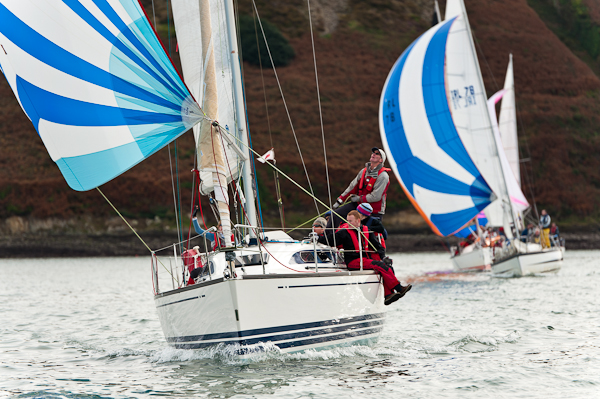
Photos by Bob Bateman



























